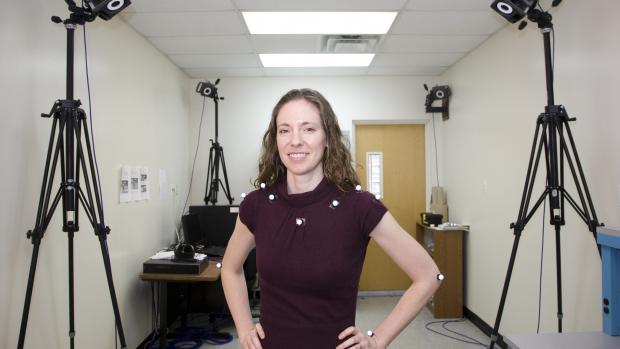NYU-Poly Student Earns Prestigious NSF Fellowship for Research to Unlock Mystery of How Human Joints Use Energy
Humanoid Robot Named DARwIn Will Inform Applications from Prosthetic Limbs to Sporting Equipment Design

Dustyn Roberts, a doctoral candidate at the Polytechnic Institute of New York University (NYU-Poly), has been awarded the prestigious National Science Foundation Graduate Research Fellowship. The highly competitive award, which recognizes outstanding graduate students pursuing research-based degrees, provides recipients with a three-year tuition stipend along with research support funds and professional development opportunities.
Roberts is the second student in NYU-Poly’s Mechanical and Aerospace Engineering Department — a group with just 66 graduate students — to be honored with this award in the last year: In 2010, Vladislav Kopman was awarded the fellowship to further his research on underwater robotic vehicles.
Working in the Applied Dynamics and Optimization Lab under the mentorship of NYU-Poly Assistant Professor Joo Kim, Roberts researches humanoid robots to provide a greater understanding of how much energy the joints in the human body expend to accomplish everyday tasks like picking up a book or opening a door.
With a humanoid robot named DARwIn, which is being specially designed with 23 motorized joints, Roberts is developing hardware and software tools to measure “robotic metabolism” — mechanical energy output at the joint level — during different activities. Understanding precisely how much energy is required to complete these tasks is a major step toward formulating a model of human energy use. These findings will inform applications ranging from prosthetic limb and sporting equipment design to injury rehabilitation and even space exploration.
“This kind of achievement is a double honor,” said George Vradis, who heads the NYU-Poly Department of Mechanical and Aerospace Engineering. “It is a well-deserved recognition of Dustyn’s innovative, impactful work, and it is a tremendous honor for our department to be home to two graduate students who have caught the prestigious attention and support of the National Science Foundation.”
As part of her fellowship, Roberts plans to validate her robotic findings in humans in partnership with colleagues at the Leon Root, M.D., Motion Analysis Lab at the Hospital for Special Surgery in New York City. The study will also further her current development of a sensible robotic hand, which is support by NASA.
Another NYU-Poly student in the Mechanical and Aerospace Engineering Department, doctoral candidate Ronald Poveda, received an honorable mention for his NSF Graduate Research Fellowship application. Poveda, who works in the Composite Materials and Mechanics Lab under the mentorship of Associate Professor Nikhil Gupta, is engaged in research to develop lightweight composite materials for biomedical use. His research proposal focused on plans to construct a replica of a bone structure capable of serving as a functional replacement for damaged human bones.
Note to Editors:
To download photo and caption, visit http://research.poly.edu/~resourcespace/?c=276&k=22f4c5b352
About Polytechnic Institute of New York University
Polytechnic Institute of New York University (formerly Polytechnic University), an affiliate of New York University, is a comprehensive school of engineering, applied sciences, technology and research, and is rooted in a 157-year tradition of invention, innovation and entrepreneurship: i2e. The institution, founded in 1854, is the nation’s second-oldest private engineering school. In addition to its main campus in New York City at MetroTech Center in downtown Brooklyn, it also offers programs at sites throughout the region and around the globe. Globally, NYU-Poly has programs in Israel, China and is an integral part of NYU's campus in Abu Dhabi.




